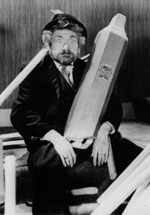Visually, in one of Hal Roach’s Max Davidson shorts, maybe. That’s Max at left.
But ethnomusicologist Henry Sapoznik, of the nonprofit Living Traditions, which is releasing “Cantors, Klezmorim & Crooners 1905-1953” ($25, JSP Records/Living Traditions) says that devotees of LeRoy Shield’s later film music (including the wonderful background music heard in the 1930’s Hal Roach shorts) can trace Shield’s musical thematic development in his earlier work as a conductor/arranger for Jewish recordings (among others) at Victor. On the the CD, which will be released to mark KlezKamp’s 25th anniversary and a festival of Yiddish music and art set for December 23-29, there’s a track that features Yiddish Theater singer Ellie Casman backed by LeRoy Shield’s RCA band.
Sapoznik, a five-time Grammy winner for early folk and country music productions, who also received a Peabody Award for his “Yiddish Radio Project,” was misquoted and misinterpreted in a poorly edited interview that popped up on the ‘net and raised a few eyebrows among Shield admirers (and this post has been revised to reflect the proper context for his remarks).
The raised eyebrows had to do with the fact that Shield was Irish. Which is not to say he didn’t want to be perceived as Jewish… in fact, the reverse is true. Steve Cloutier, who runs the Leroy Shield website learned that “…Leroy changed his name from “Shields” to “Shield” [because he thought it] would be advantageous in Hollywood if his name sounded more Jewish than Irish.” Shield/Shields changed the name quite a bit – Roy Shield was yet another variation he used.
Sapoznik suggests Shield’s early work, including the Yiddish recordings for RCA, were an influence Shield brought to [the Hal Roach] movies. Sapoznik observed, “The cantorial tradition,” so central to Yiddish recordings, “was the key DNA of Eastern European Jewish music. Everything — klezmer, Yiddish theater, folk songs — that’s what links them all together.”
He makes a point. It would be great fun to hear more of Shield’s early work. Maybe we can convince a klezmer band to cover the Hal Roach tunes, but in the meantime, I’m going to check out the “C,K, and C” CD asap.

I googled, as I bet you did. "Larry Shield" comes up as a writing credit on chestnuts like "Tiger Rag" and "Fidgety Feet."
But Larry SHIELDS is all over the web, including Wikipedia, where he's identified as an early New Orleans clarinetist who was on the recordings by the Original Dixieland Jass Band, often credited as the first jazz records (and offered up by racists as "evidence" that jazz was invented by white people). He was one of the first N.O. musicians to go to Chicago, and he later spent time in L.A., Chicago, and finally L.A., where he did not write scores for Hal Roach.
The klezmer angle is interesting, since klezmer and dixieland clarinet overlap so much (Mickey Katz, Benny Goodman playing "Bei Mir Bist Du Schoen"…), but I didn't find anything on line about that, other than the post you're quoting, the post IT's quoting, and your own post. The internet is so dang recursive.
Finally, Leroy Shield (no "s") was also known as Roy (as I learned from a different set of liner notes, to the Beau Hunks' great Little Rascals album). But Larry?
We need a Talmudic Hal Roach scholar.
.
.
Actually, there was an "s."
I'm told by Steve Cloutier from http://www.leroyshield.com that the Shield family has said that the reason Leroy changed his name from "Shields" to "Shield" was that he considered it would be advantageous in Hollywood if his name 'sounded more Jewish than Irish.'
Curiouser and curiouser.
If he was worried about that… why didn't he just play his old klezmer records for potential clients?
A member of the Beau Hunks says that it's certainly possible that among all the work Shield did for Victor records, there might well have been some sides along those lines…
If there's a reference anywhere to Leroy as "Larry," then I'm convinced. But I can't find one.